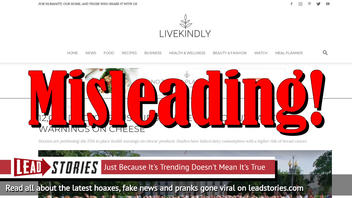
Did 12,000 doctors urge the U.S. Food and Drug Administration to put cancer warnings on cheese? No, that's not true: The vegan advocacy group Physicians Committee for Responsible Medicine (PCRM) filed a petition asking the FDA to put a warning on cheese packages that "dairy cheese contains reproductive hormones that may increase breast cancer mortality risk." While the group claims to represent 12,000 physicians, only one doctor signed the document. It is estimated that less than 5 percent of PCRM's members are doctors.
The story originated from an article published by LiveKindly.co on October 8, 2019 titled "12,000 Doctors Just Urged the FDA to Put Cancer Warnings on Cheese" (archived here) which opened:
Doctors are petitioning the FDA to place health warnings on cheese products. Studies have linked dairy consumption with a higher risk of breast cancer.The Physicians Committee for Responsible Medicine (PCRM) is urging the U.S. Food and Drug Administration (FDA) to place breast cancer warnings on cheese.
Made up of 12,000 medical professional members, PCRM would like cheese products to have warning labels similar to those on cigarette packets. It gives one example in the petition: "dairy cheese contains reproductive hormones that may increase breast cancer mortality risk."
Users on social media only saw this title, description and thumbnail:
12,000 Doctors Just Urged the FDA to Put Cancer Warnings on Cheese
Doctors are petitioning the FDA to place health warnings on cheese products. Studies have linked dairy consumption with a higher risk of breast cancer.
To claim that the PCRM is a physicians' group is misleading. Newsweek magazine reported in 2004 that "less than 5 percent of PCRM's members are physicians." The group has also been accused of being a front for the animal rights group People for the Ethical Treatment of Animals (PETA).
The Physicians Committee for Responsible Medicine (PCRM) is a wolf in sheep's clothing. PCRM is a fanatical animal rights group that seeks to remove eggs, milk, meat, and seafood from the American diet, and to eliminate the use of animals in scientific research. Despite its operational and financial ties to other animal activist groups and its close relationship with violent zealots, PCRM has successfully duped the media and much of the general public into believing that its pronouncements about the superiority of vegetarian-only diets represent the opinion of the medical community.
PCRM has not yet responded to Lead Stories' request for comment. We will update this article when it does.
A more accurate headline would have been "Vegan Advocacy Group Urges FDA To Put Cancer Warnings on Cheese."
The story correctly reports that the PCRM's petition cites studies into the diets of women who have survived breast cancer, but it fails to point out that the research is inconclusive on how much dairy consumption increases cancer risks. Some of the studies cited actually noted that dairy products may help reduce cancer risks, especially because of the benefits of vitamin D. The Susan G. Komen website's page titled "DAIRY PRODUCTS AND BREAST CANCER RISK" provides this analysis:
Some researchers have suggested the high fat content of many dairy products or traces of growth hormones in milk may increase breast cancer risk. Others have studied whether the calcium and vitamin D in dairy products may lower breast cancer risk.
A pooled analysis of data from more than 20 studies found no link between dairy product intake (including milk, cheese and yogurt) and breast cancer risk.
However, data from the Nurses' Health Study II found women who ate 2 or more servings of high-fat dairy products (such as whole milk or butter) every day had a higher risk of breast cancer before menopause than women who ate fewer servings.
At this time, it's unlikely eating or drinking dairy products is linked to the risk of breast cancer after menopause. However, more research is needed to draw solid conclusions about a possible link with the risk of breast cancer before menopause.
Read the PCRM's full petition to the FDA below:
2019 10 03 Physicians Committee for Responsible Medicine FDA Petition Breast Cancer and Cheese FINAL by Alan Duke on Scribd

















